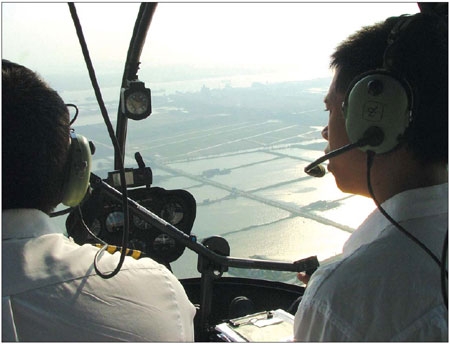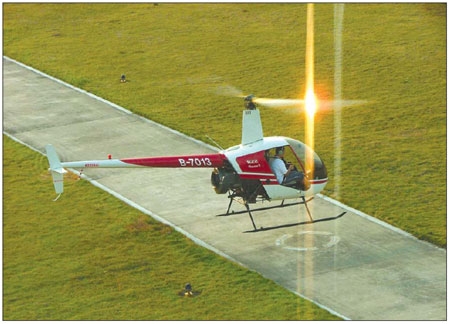New Bloom
Updated: 2011-04-08 10:38
By Wang Chao (China Daily European Weekly)
|
 An instructor at the Guangzhou Suilian Helicopter Training Co teaches students how to fly a helicopter. New professions are blossoming in China as demand for personal, luxury services, skills training and a host of other sectors are increasing. Photos Provided to China Daily
|
Despite being satisfied with his job as a "personal dog trainer", Guo says that the government is putting up barriers for his new profession.
"Take Beijing as an example. The government does not allow citizens to raise dogs taller than 35 cm, as it may hurt others. Such laws restrict our business. It also reflects the ignorance of regulators. Dogs should be classified by breed and not size," says Guo.
Unlike Guo, Guan Xiwen's services are targeted at the affluent group in China. To take his classes, clients need to pay at least 200,000 yuan.
Guan is one of the six coaches at the Guangzhou Suilian Helicopter Training Company in South China's Guangdong province, that teach people how to fly a helicopter. He is busy most of the time as he has six to seven students to train at a time.
"Soaring like a bird in the sky is something that everyone dreams about. When people make enough money and are able to afford helicopters of their own, they come to professionals like us for training."
Guan says most of his students take the classes for various reasons. While some come with a desire to learn it as a vocation, there are others who are sent by their employers to acquire additional skills. There are also students who have their own helicopters, but come to classes just for fun, he says.
"Rich people are tired of cars and golf. Flying is certainly much cooler," says Guan.
|
 Photos Provided to China Daily
|
The training is not cheap and costs anywhere upwards of 200,000 yuan depending on the model. To get a license, students need to fly at least 45 hours, according to the requirements from the Civil Aviation Administration of China.
With such high costs it is only natural that the clientele is also rich. "Most of my clients are managers or businessmen," says Guan.
"There are many restrictions on the low-altitude airspace in China, and there is not enough infrastructure. Customers cannot undertake long flights as most of the airports lack dedicated areas for private helicopter landings and parking."
"That means we have to cancel some flying classes to meet the policy requirements," says Guan.
Hao, however, says that policy constraints are not the only barrier for development of new professions. Lack of industry standards and evaluation systems are other major problems, he says.
"For example, how does one evaluate the performance of a personal luxury goods shopper? How does one know whether or not they are deceiving customers?"
The government should expedite the legislation process for new professions to protect customers' rights and sustain the momentum, says Hao.
But several others like Liu Xiaodong, however, feel that despite the high profit margins, new jobs have innumerable risk factors and unsteady revenue flows.
"Service-based jobs are usually paid by work volumes, or the level of customer satisfaction," says Liu, who has worked in vocational institutes for more than 20 years. "It is quite possible that new job practitioner can earn a lot on one day and virtually nothing for the next few months."
Hao says that most of the new jobs are service-oriented and involves personal reputation. He feels that it would be difficult for newcomers to compete in the beginning of their careers.
"People going to gyms can often notice this phenomenon as personal coaches with the same experience have different client numbers. Customers search for experts based on referrals from family, colleagues and friends," says Hao.
Lack of academic and comprehensive training is also plaguing the growth of new professions. Most of the new job practitioners either learn the skills themselves, or get trained from vocational schools. There are very few colleges or universities that offer training in such fields.
"The disparity between higher education and demand has led to a situation where there is no sustainable supply of high-quality talent," says Liu.
E-paper

Green mission
Tony blair believes China will take a leading role to fight climate change and cut emissions.
The spring of new professions
Real modern times
F1 sponsors expect returns from Shanghai stop
Specials

Share your China stories!
Foreign readers are invited to share your China stories.

Have you any wool?
The new stars of Chinese animation are edging out old childhood icons like Mickey Mouse and Hello Kitty.

Fill dad's shoes
Daughter and son are beginning to take over the family business of making shoes.
